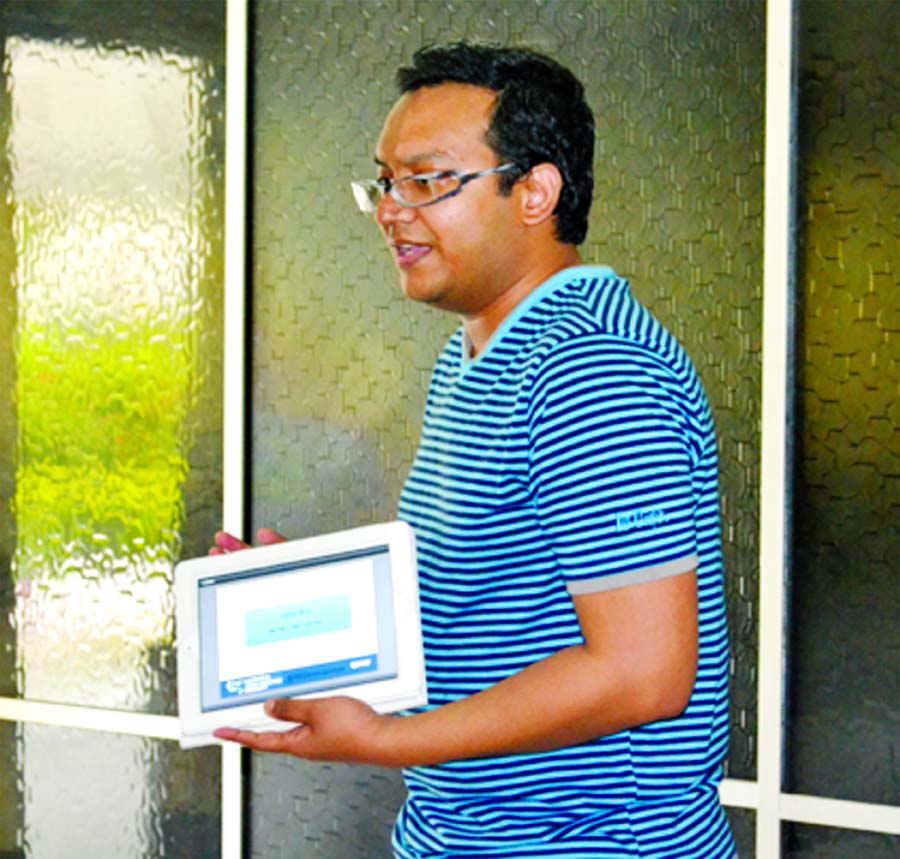
Staff Reporter : Natural calamity like flood, storm, tremor and tidal bore are part of our life. Loss of life and property, cash and crops also are no exception. Apart from it, the adverse effect of the climate change has worried us. On the one hand, the tremendous pressure of the population on a small land like Bangladesh, and on the other hand, climate-change’s adverse effect like SIDR, AILA and fear of loss of means of livelihood of a large number of people have made all fretful and perplexed. Today’s world is the world of science and technology. So, rising consciousness and knowledge as to how to save life and property can reduce losses of life and property to a great extent. To achieve the objective, research and advance technology can help us. Realising it, a Bangladeshi named Syed Ali Tarek has been doing research work at John Moores University in Liverpool, UK and by this time, he has proved that a particular type of Tablet Device (TD) which can be used as unique tool to improve the understanding level of the common people, is essential for the disaster management work. When contacted, he said that Paris Deal was signed in 2015 to work out ways to protect the present and the future generations from the effect of the climate change. There is no alternative for consciousness in handling the pre and post natural calamity effect. And to raise consciousness, the role of technology is undeniable today. We have seen how the cell phones have reached every body’s hand. They handle it efficiently even though most of them have no idea about technology. Tablet Device is such a technology that one can learn its operation easily. For this, just a simple training is necessary. TD is now used in the classrooms of the Western hemisphere, but the developing and the less developed countries lag behind. Experiences say that the poor and the coastal people are the severest victims of the natural calamities. That is why, tocheck the loss of life and property of those people, Ali Tarek started a research work in 2012. Educationist by profession, he is also a fellow of Royal Arts Society and Royal Asiatic Society. Tarek says, training was imparted with TD in few areas of Khulna and Dhaka Divisions. Not only the educated people were given training, the uneducated and the common people were also included in the programme. He says that use of TD is not only first in Bangladesh, but also in the whole world. The training on TD was arranged in eight areas of Bangladesh between 2012 and 2015. Though the medium of instruction of technology is English, the Interface of the programme is in Bengali. Thus the users can know about pre and post disaster management. When contacted with the trainees, many of them from Dhaka and Khulna Division said, though natural calamities are not new to them, the training is new and would benefit them greatly. Syed Ali Tarek said, since everything of the programme is in Bengali language, every man and woman took part in the training at ease. The success has made him optimistic about his research. This device is good enough for educating the people and creating awareness in the matters of disaster management. Tarek says some aspect of the training has been disseminated at international seminars and conferences. It will be made public in Bangladesh at the end of the current year. He has urged upon the government as well as the rich to extend their support to popularise the system. Certainly it will usher in new hopes in disaster management.

